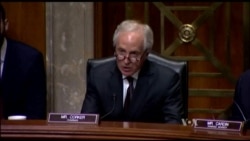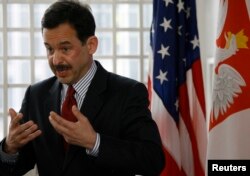U.S. lawmakers said Thursday that Iran’s continued missile tests had cast doubt on the viability of an international nuclear accord with Tehran and required a stronger American response.
“I think the agreement is off to a really terrible start,” said Senate Foreign Relations Committee Chairman Bob Corker, a Tennessee Republican. “Iran has convicted an American Washington Post reporter, launched cyber attacks against the State Department, defied a U.N. travel ban, exported weapons to Syria and Yemen, violated the U.N. ballistic missile test ban twice and lied to the IAEA [International Atomic Energy Agency].”
“We see no evidence of them paying a price for any of these actions,” Corker added at the start of a hearing to which top Obama administration officials were called to testify.
Stephen Mull, the State Department’s lead coordinator for Iran nuclear implementation, said Iran’s objectionable actions fell outside the scope of the nuclear accord finalized earlier this year, known as the Joint Comprehensive Plan of Action. On the accord itself, he said Iran is moving to comply.
“Iran has begun dismantling its uranium enrichment infrastructure by removing, so far, more than 5,000 centrifuges,” Mull said. “Iran is also reducing its stockpile of various forms of enriched uranium.”
Uranium to Russia
Mull added that Iran was on track to ship tons of enriched uranium to Russia, and to render inoperable its Arak nuclear reactor.
Corker repeatedly pressed Mull on why Iran would continue missile tests if it intended to adhere to a pact that denies Tehran the material for a nuclear payload.
“What does the administration draw from the fact that they are testing missiles that throughout history have only been used [built] to deliver nuclear weapons?” Corker asked. “This is totally inconsistent with rational thinking.”
“I’m not in a position to characterize what the Iranian government is thinking,” Mull said. “We are focused on making sure they cannot develop a nuclear weapons capability.”
The committee’s top Democrat, Ben Cardin of Maryland, said Iran’s recent actions showed that “Iran cheats and they want to develop a nuclear weapon through covert activities. That is not a surprise.”
“As we go forward, we need to make sure there is zero tolerance from any deviation for Iran’s obligations under the JCPOA,” Cardin added.
Fellow Democrat Robert Menendez of New Jersey echoed that point.
“Iran over the last two decades has tested the will of the international community,” Menendez said. “If we allow them to continue to test us without consequence, believe me, they will continue to expand [their actions].”
Mull and Assistant Secretary of State Thomas Countryman repeatedly stressed that non-nuclear sanctions against Iran would remain in place and sanctions lifted under the JCPOA could be reimposed if Tehran violated the terms of the pact.
'Permissive environment'
That did not satisfy Corker, who accused the administration of “creating a permissive environment” in hopes of affecting elections in Iran next year.
“I don’t understand the argument about a permissive environment,” Countryman responded. “The Obama administration is doing exactly the same thing the Bush administration did, which is to respond to every violation of [U.N.] ballistic missile resolutions, of human rights, of terrorism, of hostage-taking with the legal authorities Congress has given us.”
Republican Senator Cory Gardner of Colorado suggested that the administration “prevent Iran from receiving billions of dollars” in sanctions relief under the JCPOA.
“And that violation by us of the JCPOA would lead to a resumption of the [Iranian] nuclear program,” Countryman said.
Iranian President Hassan Rouhani said Wednesday that he expected sanctions to end in coming weeks.
Iran’s state news agency quoted the country’s defense minister as saying missile tests were meant “to tell the world that the Islamic Republic of Iran acts based on its national interests.”






